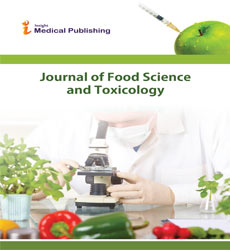Genetically Modified Crops: Safety, Costs and Environmental
Department of Botany, Government Degree College Naguman Peshawar, Peshawar, Pakistan
- *Corresponding Author:
- Abdul Majeed
Department of Botany, Government Degree College Naguman Peshawar
Peshawar, Pakistan
E-mail: majeedpsh@gmail.com
Received date: January 27, 2018; Accepted date: January 29, 2018; Published date: February 05, 2018
Citation: Majeed A (2018) Genetically Modified Crops: Safety, Costs and Environmental. J Food Sci Toxicol. Vol.2 No.1.2
Introduction
Crops derived from genetic introgression of desired agronomic traits from typical or anomalous sources through biotechnological approaches are termed as genetically modified crops (GMCs). Reliance on GMCs than traditional crops has been widely perceived as a prospective solution to future food issues, particularly in the context of increasing population of the world. Although there is sufficient evidence that introduction and release of GMCs have resulted in elevated food production, major advocacy of hyperbolic benefits of GMCs, however, comes from corporate sectors and industrial stakeholders which are pouring billions of dollars in research programs associated with the development of GMCs. Keeping aside the overstated significance of GM crops, substantial research is needed to direct the pertaining issues of costs, safety, ecological and environmental consequences of those crops.
Economic Costs and Safety
Inconsistent views exist in research and public circles regarding the actual costs and hygienic safety of GM crops. Since large corporate sectors have their own vast interest in the commercialization of GMCs, they often highlight their lower costs, economic returns, safety and yield outputs. The safe, economical and advantageous depiction of GMCs has attracted millions of farmers to adopt these crops over traditional seeds in the US and throughout the world [1]. In terms of costeffectiveness of GMCs, major emphasis is given on reduced fertilizers and pesticides application while growing these crops; however, such benefit seems significantly negligible for growers because of high prices set by corporates for GMCs seeds [2]. In some studies, it has been found that adoption of GMCs had no effects on the profitability of US farmers [3,4]. While Gardner et al. [5] stated that growing of GM crops had a significant impact on profit of growers due to labour, time and fertilizers savings. In the developing countries, particularly in Asia, farmers largely rely on traditional seeds for crop growing because of high costs of GM seeds. Moreover, in developed countries, growers tend to adopt for GM seeds not because of potential profitability but to reduce time, labour.
Safety concerns of GM crops also remain an ambiguous issue due to lack of systematic and accurate analysis of the products obtained from these crops. Major concerns regarding the biosafety of GMCs are found in consumers from Europe where wide-scale acceptance of GMCs is negligible as compared to the US and other countries. Minimal interest in Europe and in countries where large-scale adoption of GM crops is negligible implies some biosafety concerns associated with those crops. Although there are no authentic reports about the hazardous effects of GMCs products on the human being, still some research findings indicate that products obtained from GM crops had some severe toxic effects on trailed animals [6,7]. Thus, greater research exertions are required to systematically evaluate the safety issues of GMCs and their products.
Environmental and Ecological Perspectives
Although it has been widely asserted that cultivation of genetically modified crops contributes to minimizing environmental challenges by reduced application of fertilizers and herbicides, the debate on the environmental and ecological implication of GMCs continue in research circles. Advocates of such assertions focus only on reduced application of fertilizers and pesticide in GM cropping system; however, they do not address the release of hazardous substances and chemicals used during the developmental processes of GMCs. Ecological concerns of GMCs such as invasiveness and biodiversity disturbance of natural flora are emerging issues which seem to intensify in future. Apparent benefits of GMCs are supposed to attract millions of growers throughout the world to heavily rely on these crops which will eventually result in diminished conventional non-GM crops. Conclusively, the susceptibility of genetic pool and ecosystem disturbances will be difficult to manage in future as we move forward to adopt more for genetically modified crops.
References
- Fernandez-Cornejo J, Wechsler JJ, Livingston M, Mitchell L (2014) Genetically engineered crops in the United States. Economic Research Report ERR-162 (United States Department of Agriculture, Washington, DC).
- Qaim M, De Janvry A (2003) Genetically modified crops, corporate pricing strategies and farmers' adoption: The case of BT cotton in Argentina. Am J Agric Econ 85: 814-828.
- Fernandez-Cornejo J, Klotz-Ingram C, Jans S (2002) Farm level effects of adopting herbicide-tolerant soybeans in the U.S.A. J Agric Appl Econ 34: 149-163.
- Marra MC, Pardy PG, Alston JM (2002) The payoffs to transgenic field crops: An assessment of the evidence. AgBioForum 5: 43-50.
- Gardner JG, Nehring RF, Nelson CH (2009) Genetically modified crops and household labor savings in US crop production. ERR-162 (United States Department of Agriculture, Washington, DC).
- Bakshi A (2003) Potential adverse health effects of genetically modified crops. J Toxicol Environ Health Part B 6: 211-225.
- Dona A, Arvanitoyannis IS (2009) Health risks of genetically modified foods. Crit Rev Food Sci Nutr 49: 164-175.
Open Access Journals
- Aquaculture & Veterinary Science
- Chemistry & Chemical Sciences
- Clinical Sciences
- Engineering
- General Science
- Genetics & Molecular Biology
- Health Care & Nursing
- Immunology & Microbiology
- Materials Science
- Mathematics & Physics
- Medical Sciences
- Neurology & Psychiatry
- Oncology & Cancer Science
- Pharmaceutical Sciences
